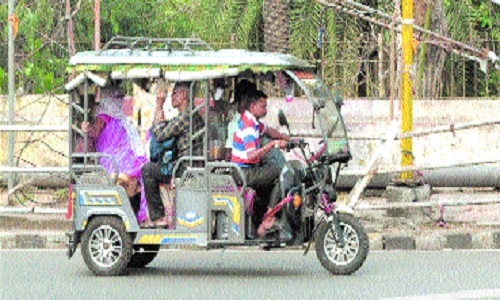e-rickshaws proving a headache for police, commuters
| Date :29-Apr-2024 |

By Ankita Garg
Although e-rickshaws on city roads are good for environment to keep it free from pollution, but at the same time it is dangerous for crowd and are proving a headache for the traffic police team. The e-rickshaws get their vehicle registration number from Road and Transport Office (RTO) but they do not require any permit to operate on city roads. This has become the main reason that traffic or police have no data of number of e-rickshaw plying in the city. These rickshaws are working on a single theory that they have maximum limit of commuting 100 kms per day. They have no fixed path, route or areas to carry paseengers. Other autos, rickshaws and public vehicles have a fixed route to ply on road mentioned in their license and in this way, police team immediately capture the particular auto driver or any public vehicle driver in case of accident or other issues.
Unfortunately, these e-rickshaws have no control over the route. Main problem being faced by the traffic police is that they do not follow overloading rules and even no headlight is being used during evening hours to save their battery. Even they have no fixed price to charge per passenger. Interestingly, 50 per cent e-rickshaws on city roads are carrying furniture, vegetables, fruits and other items like a vendor. According to traffic police, there are more than 2000 e-rickshaws registered in the city but half of them are working to load goods. Savita Kanas, traffic police said, “e-rickshaws have registration but they do not have any work permit or specific route or any fixed fare charges. They do not follow rules like a commercial vehicle. They operate where ever they want to go. Once they charge their vehicle at home, they play where ever they want but for maximum 100 kms in a day.” She further informed that these rickshaw are governed by Ministry of Urban Development under the Green Energy concept and they do not come under commercial vehicle. However, their limits, capacity and carrying weight is decided by they do not follow the same.
Dr Rajesh Kumar Nema, Professor electrical Engineering at MANIT says, “e-rickshaw concept was started for reserved areas like a zoo, temple, railway stations premises and other covered areas. These rickshaws have a fixed limit to ply and they should not be used for commercial purpose. They have fixed battery limit and carrying capacity. Their pick-up is very low and such vehicle can overturn anytime which is dangerous for passengers.” He further said, no doubt these rickshaws are not safe at all as in case of overheating, vehicle can burst on the road. According to an RTO, there are 2200 e-rickshaws registered under the Vehicle Act in Bhopal. The new electrical vehicle policy aims to boost e-rickshaw usage with subsidies, planning to replace all fossil fuel based commercial vehicles to reduce pollution. The e-rickshaws’ smaller size is a boon for navigating traffic jams and narrow streets, yet their erratic parking is causing congestion and affecting local businesses.